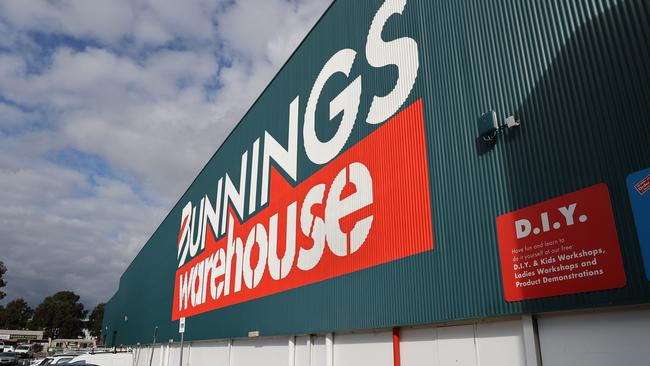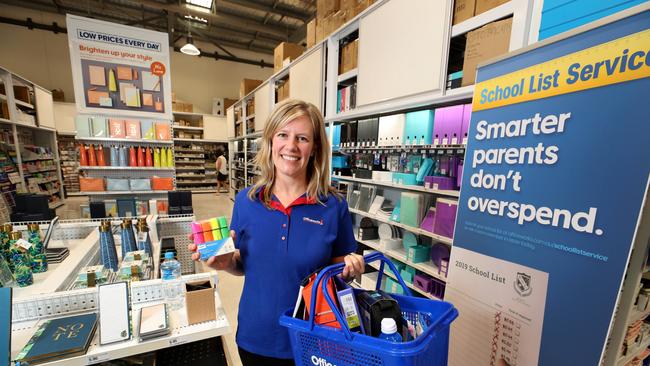Wesfarmers records a profit rise and lifts its interim dividend by 10pc
The conglomerate, which owns Bunnings and Kmart, warns that it expects elevated inflation and higher interest rates to impact demand in parts of the Australian economy.

Wesfarmers boss Rob Scott revealed the ocean of data collected from customers at its retail businesses led by Bunnings, Kmart and Officeworks is pointing to a shift by consumers to more frugal spending habits, but the Australian economy was in a strong position to cope with further interest rate rises this year.
The managing director of the Perth-based conglomerate said consumers were more concerned about cost of living pressures as many brace for a roll over from fixed mortgages to higher-priced variable loan repayments and this should serve to only further highlight his retail arm’s traditional value offer.
“Certainly a lot of the data we see and the feedback from our customers tells us that customers are more concerned about cost of living pressures, and there is a lag effect between the base interest rates going up and then the impact that has on household purchasing behaviour,” Mr Scott said.
“We are continuing to see strong customer levels and transactions across key value items, so entry price point products and certainly those that are available in businesses like Kmart, Officeworks and Bunnings are still trading really well.
“So the data does suggest that customers are becoming more value conscious and we are expecting that will continue and we will see an even greater focus on value, certainly over the next six months, as the impact of some of the interest rate changes start to take effect.”
This shifting mood of shoppers was evident in Wesfarmers half-year results released on Wednesday that showed a strong earnings leap in its discount department store division, Kmart Group, and backed by earnings growth at Officeworks. Hardware giant Bunnings, typically the workhorse of the group, only delivered a 1.5 per cent rise in half-year earnings but Wesfarmers’ quiet achiever chemicals, energy and fertilisers business came to the rescue with a near 50 per cent gain in half-year earnings.
Wesfarmers reported interim revenue up 27 per cent to $22.558bn as net profit improved by 14.1 per cent to $1.384bn. The company declared an interim dividend of 88c per share, up from 80c, payable on March 28.
And while all its key divisions did lift revenue and profit for the December half, losses at its problem child online marketplace Catch Group worsened dramatically in the period with the business posting an interim loss of $108m, up from a loss of $44m in 2021. Mr Scott conceded the Catch performance was unacceptable and that errors had been made at the business that Wesfarmers paid $230m for in 2019.
Mr Scott warned the conglomerate expected elevated inflation and higher interest rates to impact demand in parts of the Australian economy and result in households continuing to become more value conscious.
However that in this environment, the strong value credentials and low-cost operating models across the group’s retail businesses meant Wesfarmers was well positioned to meet changing customer demand as customers adjust to cost pressures.
The company said retail trading results through the first five weeks of the second half of the 2023 financial year had been broadly in line with growth reported for the first half, supported by strong growth in those areas most affected by Covid-related disruptions in January 2022 when elevated cases of the Omicron variant were impacting operations and customer behaviour.
Mr Scott said the Australian economy was proving to be resilient in the face of nine consecutive interest rate hikes by the RBA.
“Overall I think there is still a degree of resilience within the Australian economy. Importantly, we still have very low levels of unemployment, virtually everyone that wants a job has got a job.
“We’ve also seen high levels of workforce participation and I think that is a really important feature of the economy. And whilst I think there’ll be a normalisation of spending, whilst people are meaningfully employed they will still have the ability to spend on the key necessities.
“So we feel reasonably confident that we can maintain momentum even if we were to see more challenging times.”
Within its key divisions, revenue at Bunnings increased 6.3 per cent to $9.79bn with earnings increasing 1.5 per cent to $1.278bn as poor weather towards the end of the year took some polish of its sales.
Revenue for the Kmart Group, which includes Target, increased 24.1 per cent to $5.714bn million for the half, with earnings increasing 114 per cent to $475m. “Kmart Group’s significant earnings result reflected strong operational execution, with comparable sales and volume growth, in addition to the impact of a normalisation in trading conditions,” Mr Scott said.
Officeworks’ revenue increased 4.5 per cent to $1.651bn for the half, with earnings increasing 3.7 per cent to $85m. The WesCEF chemicals, energy and fertilisers arm posted a 48.6 per cent rise in earnings to $324m.
There were some cost pressures at its Mt Holland lithium project with construction of the mine and concentrator well advanced, and first earnings for the project expected in the first half of the 2024 calendar year as sales of spodumene concentrate ramp up. First production of lithium hydroxide is now expected in the first half of the 2025 calendar year, around six months later than previous guidance.






To join the conversation, please log in. Don't have an account? Register
Join the conversation, you are commenting as Logout